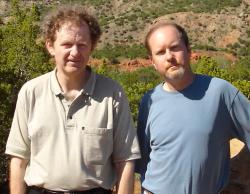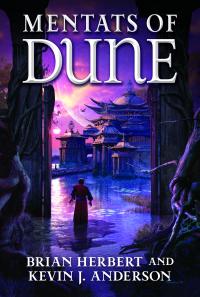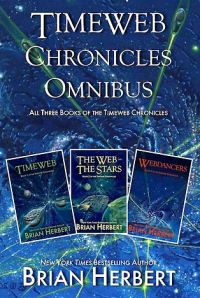
 I am excited to welcome author Brian Herbert and Kevin Anderson, who are celebrating the release of Mentats of Dune.
I am excited to welcome author Brian Herbert and Kevin Anderson, who are celebrating the release of Mentats of Dune.
Gilbertus Albans has founded the Mentat School, a place where humans can learn the efficient techniques of thinking machines. But Gilbertus walks an uneasy line between his own convictions and compromises in order to survive the Butlerian fanatics, led by the madman Manford Torondo and his Swordmaster Anari Idaho. Mother Superior Raquella attempts to rebuild her Sisterhood School on Wallach IX, with her most talented and ambitious student, Valya Harkonnen, who also has another goal – to exact revenge on Vorian Atreides, the legendary hero of the Jihad, who she blames for her family’s downfall.
Meanwhile, Josef Venport conducts his own war against the Butlerians. VenHold Spacing Fleet controls nearly all commerce thanks to the superior mutated Navigators that Venport has created, and he places a ruthless embargo on any planet that accepts Manford Torondo’s anti-technology pledge, hoping to starve them into submission. But fantasies rarely surrender easily…
The Mentats, the Navigators, and the Sisterhood all strive to improve the human race, but each group knows that as Butlerian fanaticism grows stronger, the battle will be to choose the path of humanity’s future – whether to embrace civilization, or to plunge into an endless dark age.
_____________________________________________
DUNE—It Always Seems to Be Relevant
 Frank Herbert’s DUNE is the best-selling science fiction novel of all time. It changed the genre of science fiction in its scope, its worldbuilding, its themes, but it also has a continuous relevance to the world around us. Now, as we approach the fiftieth anniversary of the publication of DUNE, the great universe created by Frank Herbert seems just as relevant as ever.
Frank Herbert’s DUNE is the best-selling science fiction novel of all time. It changed the genre of science fiction in its scope, its worldbuilding, its themes, but it also has a continuous relevance to the world around us. Now, as we approach the fiftieth anniversary of the publication of DUNE, the great universe created by Frank Herbert seems just as relevant as ever.
In a far future galactic empire, space travel, commerce, and even civilization itself depends upon a vital substance—the spice melange—which is found on only one planet, a hellish desert wasteland subject to horrific storms, attacks by giant sandworms, a place where water is a highly prized commodity. And the rugged people who survive there are clannish in nature, seen as religious fanatics by outsiders. Powerful governments wrestle over control of the spice.
Substitute “oil” for “spice” and the relevance is obvious.
But that’s only the first of many takeaways from DUNE. Frank Herbert himself was concerned with what he called “hydraulic despotism,” governments controlling the flow of water for agriculture and population needs. A person who controlled the flow of water could control the land and the people living there. The water must flow…
In the novels, the planet Dune became such a wasteland, and subsequently a testbed for conservation efforts, through ecological disaster. In the 1970s DUNE was championed by the environmental movement, regarded as a cautionary tale of what might happen if we didn’t take care of Earth.
In DUNE, the militant desert tribes—the Fremen—are relentless and ruthless, seen as mere rabble by the far-technologically-superior Imperium. When Emperor Shaddam IV sends his military to Dune to stop an uprising that is affecting the flow of spice, he assumes the war will be won without much effort, that he’ll easily put down the Fremen rabble. But the Fremen prove to be a far more difficult foe than he expected. Many readers saw this as incredibly prophetic, an echo of when George W. Bush launched the Iraq War, assuming “shock and awe” would be enough to take care of the problem within mere weeks….
The main character, Paul Atreides, is a young man born to privilege, son of a Duke, who—after a series of betrayals and tragedies—turns against the way of life he knew so well and flees into the desert to live among the militant desert tribes who have declared a jihad against the Imperium; Paul lives in hidden desert redoubts and leads the rebellion against the Emperor, though he is hunted down for years. After 9-11, many Dune fans remarked on the disturbing biographical similarities between Paul Atreides and Osama Bin-Laden.
The Dune novels are rich with politics, economics, religion, ecology, and relevance to our lives. Beyond the original six Dune novels written by Frank Herbert, Brian Herbert and I have written a dozen more novels that explore other aspects of the Dune universe. In our most recent novel Mentats of Dune, which follows 2012’s Sisterhood of Dune, we tell the story of the great schools of the Dune universe: the formation of the Bene Gesserit Sisterhood, the human-computer Mentats, the Swordmasters, the famed Suk Doctors, and the Spacing Guild and their mysterious Navigators.
The framework of this formative time period, ten thousand years before the novel DUNE, is that the galactic Imperium is in its embryonic stages, still reeling in the aftermath of the Butlerian Jihad, a titanic war against the tyranny of thinking machines. The Emperor is weak and uncertain, a poor leader. The Mentat school, the Bene Gesserit Sisterhood, the Spacing Guild, and others are caught in a tumultous war between faith and science. A fanatical movement, the Butlerians, intends to eradicate all advanced technology, which they consider dangerous. They have wiped out computers and all kinds of high-tech systems, but the forces of reason fight back, hoping to prevent humanity from plunging into a Dark Age.
Does that resonate with modern headlines? You’ll have to read the book and decide for yourself.
______________________
Meet Brian Herbert and Kevin Anderson!
 BRIAN HERBERT, the son of Frank Herbert, is the author of multiple New York Times bestsellers. In 2003, he published Dreamer of Dune, a moving biography of his father that was nominated for the Hugo Award. His other novels include Man of Two Worlds (written with Frank Hurbert), Sudanna Sudanna, and The Little Green Book of Chairman Rahma.
BRIAN HERBERT, the son of Frank Herbert, is the author of multiple New York Times bestsellers. In 2003, he published Dreamer of Dune, a moving biography of his father that was nominated for the Hugo Award. His other novels include Man of Two Worlds (written with Frank Hurbert), Sudanna Sudanna, and The Little Green Book of Chairman Rahma.
Contact Info: Website | Blog | GoodReads
Want to purchase Brian’s novels?
The Timeweb Chronicles Omnibus
Man of Two Worlds (written with Frank Hurbert)
The Little Green Book of Chairman Rahma
Ocean Cycle Trilogy (with Jan Herbert)
Hell Hole Trilogy (with Kevin J Anderson)
- Hellhole
- Hellhole Awakening
- Hellhole Inferno (August 12, 2014)
KEVIN J. ANDERSON has written dozens of national bestsellers and has been nominated for the Nebula Award, the Bram Stoker Award, and the SFX Readers’ Choice Award. His critically acclaimed original novels include the ambitious space opera series The Saga of Seven Suns, including The Dark Between the Stars, as well as the Terra Incognita fantasy epic with its two accompanying rock CDs. He also set the Guinness-certified world record for the largest single-author book signing.
 Contact Info: Website | Blog | Facebook | Twitter | Google+ | GoodReads
Contact Info: Website | Blog | Facebook | Twitter | Google+ | GoodReads
Want to purchase Kevin’s novels?
Star Challengers Trilogy
Dan Shamble, Zombie PI
- Death Warmed Over
- Unnatural Acts
- Hair Raising
- Road Kill
- Naughty and Nice
- Stakeout at the Vampire Circus
- Slimy Underbelly (August 26, 2014)
_____________________________________________
Thank you Brian Herbert and Kevin Anderson for taking the time to stop by Literary Escapism!
